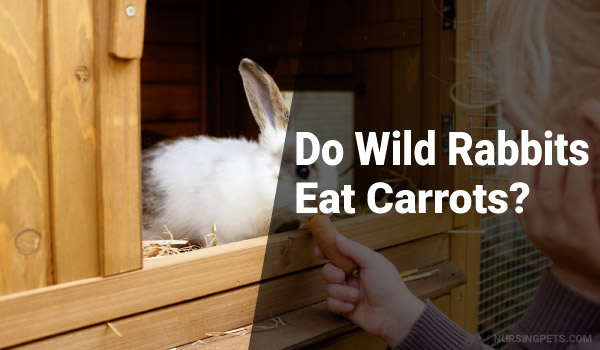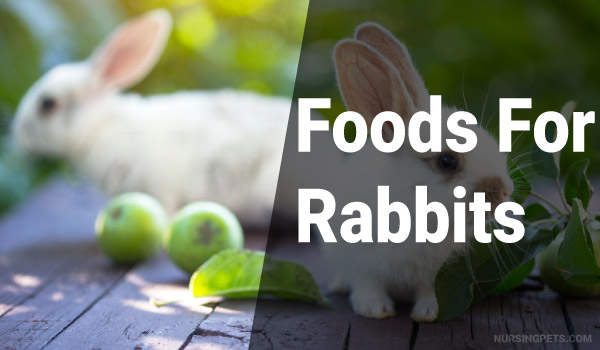Do Wild Rabbits Eat Carrots? True Guides
There is a misconception most people have about carrot and rabbit. Whether it’s for famous Bugs Bunny cartoons, media, or books that present this information to us.
Before looking into the matter in detail, I was also banking on the same concept that rabbit and carrot are connected inextricably. So, is it true that rabbit outlives of carrot? No, they don’t.
Obviously, not as of their main food course you may see on TV. Carrot contains lots of sugar within it. This is why carrot is not the nourishment food option for a wild or domestic rabbit. Eating too much carrot can lead to tooth degradation, gaining weight, and digestive problems.
So, do wild rabbits eat carrots? They even like carrots a bit? What are their favorite foods? What types of food should you give to your rabbits? All of these questions and similar to more of these will be answered consequently.
So, keep up with me until the end to know it all.
Do Wild Rabbits Eat Carrots?

Some people believe rabbits exclusively subsist on carrots. Well, for your information – they don’t. So, do they even eat carrots? Obviously, but they don’t like it much.
How often do they eat them? Occasionally. Why so? Root food contains too much sugar in it. Eating them in amounts will lead them to some problems.
Rabbits do love a bunch of varieties of food. But wild rabbits don’t like many root vegetables and fruits. It is recommended to the owners of rabbits or people who are planning to feed them, don’t give the rabbits carrots as of their daily diet.
Can You Even Feed the Carrots to a Rabbit Then?
Yes, you can. But Should you? No, you shouldn’t. At least not as regular food.
Root vegetables contain a slight amount of cellulose/fiber that helps the digestion process. But, rabbits have a sensitive digestive system. So, eating them in excessive amounts may upset their stomach.
Carrots are like chocolate for the rabbits, eating carrots more than occasionally will lead to tooth decay.
Gaining weight is yet another problem with eating carrots too often. So, remember these before serving carrots to the rabbits next time.
If Rabbits Don’t Like Carrots, then From Where Did the Idea Come From?
Most of us will agree on the Famous Bugs Bunny cartoon. We saw bunny continuously munching on carrots. So, from where they got the idea? Cartoon artist, Bob Clampett, claims that he got the idea while having a carrot and discussing the plot.
What Do the Wild Rabbits Eat Then?
The largest portion of the diet for a wild rabbit consists of a wide variety of plants, different types of dry and fresh grasses. Bark and twigs are also on this list. During warmer season, they usually feed by green plants, but they feed on bark, twigs, and sprouts in the colder season.
Can the Domestic Rabbits Eat Carrots?
Whether domestic or not, you may offer carrots to the rabbits not frequently. Domestic rabbits do not choose their food by themselves. So, you should be careful about their daily diet. You should offer proper nutritious food. If you don’t make sure about this, you can always discuss the matter with a vet.
Foods for Rabbits

Since we’re talking about the rabbit’s food, you should know more details about the daily diet of a rabbit. So, what can you offer to the rabbits in your yard or house?
There are some things you should offer more than others. I’m giving you a list of foods you can offer to a rabbit.
As I already talked about green items they prefer. There are different sorts of leafy greens you can offer.
Leafy greens should comprise 75% of the daily diet (Remember, due to the presence of oxalic acid, you shouldn’t offer too many varieties in a single day). There are two types of leafy greens — some with a higher amount of oxalic acid and the other.
I’m presenting the food lists in different groups for your better understanding.
Group 01: Leafy Greens (High in Oxalic Acid)
- Parsley
- Spinach
- Mustard greens
- Beet Greens
- Swiss Chard
- Radish Tops
- Sprouts (6 or more days old sprouts)
Group 02: Leafy Greens (Low Oxalic Acid)
- Arugula
- Carrot tops
- Cucumber leaves
- Endive
- Escarole
- Friese Lettuce
- Kale (all types)
- Mache
- Red or green lettuce
- Romaine lettuce
- Spring greens
- Turnip greens
- Dandelion greens
- Mint (any variety)
- Basil (any variety)
- Watercress
- Wheatgrass
- Chicory
- Raspberry leaves
- Cilantro
- Radicchio
- Bok Choy
- Fennel (the leafy tops as well as the base)
- Borage leaves
- Dill leaves
- Yu Choy
- Snow peas (pass on the sweet peas and dried peas of any variety)
- Kale
- Endive
- Collard greens
- Sweet red and sweet green bell peppers
- Celery leaves
- Mustard greens
- Bok choy
- Mint and basil
- Beet greens
Group 03: Non-Leafy Vegetables
This group should comprise no more than 15% of the daily diet. You can offer this category in a small amount to your rabbits.
- Carrots
- Celery
- Brussel sprouts
- Summer squash
- Zucchini squash
- Bell peppers (any color)
- Cabbage (any type)
- Broccoli (leaves and stems)
- Chinese pea pods (the flat kind without large peas)
- Edible flowers (hibiscus, roses, pansies, nasturtiums)
Group 04: Hay
Hay is one of the essential and healthy diets for rabbits. You can offer them to a wild or domestic one. What type of hay can you offer to the rabbits?
- All sorts of hay (except Alfalfa. This is better for younger ones)
- Barley
- Barley straw
- Bermuda grass
- Clover
- Oat
- Timothy
- Prairie and ryegrass
Fruits You Can Offer to a Rabbit
You can give them fruits too. Only 10% of the daily diet is allowed for fruits. Some fruits also have too much sugar. You shouldn’t give them too much. Like- Banana. Other fruits you can offer:
- Apple (any variety, without stem and seeds)
- Cherries (any variety, without the pits)
- Pear
- Peach
- Plum (without the pits)
- Kiwi
- Papaya
- Mango
- Berries (any type)
- Pineapple (Please remove skin)
- Banana (remove peel)
- Melons (any – can include peel and seeds)
- Star Fruit
- Apricot
- Currants
- Nectarine
- Plums (pre-pitted, please)
- Honeydew
- Papaya
One thing you should always remember. Whether it is a vegetable or a fruit, wash thoroughly before giving them to the rabbit. They have pesticides on them, which may cause severe diseases. Before serving these foods to your rabbit, make sure that you wash the fruits and vegetables thoroughly.
Which Foods Not to Offer to a Rabbit?
We talked about lots of foods you may offer to the rabbits. There are some foods also which we discourage you from giving the rabbits in your yard or your house.
- Iceberg Lettuce
- Cauliflower and Broccoli
- Rhubarb
- Potatoes
- Peanut Butter
- Walnuts
- Food made for other Animals
- Chard
- Cereal
Some of these foods contain chemicals that are sedative, while some can cause gassiness and don’t have enough fiber in it. That is why giving them unplanned may cause serious illness.
What Can Kill a Rabbit Suddenly?
There are some foods you shouldn’t offer carelessly. Also, there are some things you should look into while having a rabbit. There are some situations which can kill your rabbit too. So, remember these too.
- Myiasis, or deadly fly-strike
- Injured during improper handling
- Heart attack from fright
- Injury from another pet
- Abortion
- Poison
- Swallowing a sharp object
- Bunny was older
- Pre-existing health condition
Frequently Asked Questions
01. What is a good pellet?
Pellet should have at least 18% fiber in it, and it should be fresh too. Hay can feed 24 hours. Pellets made from Alfalfa should be okay for younger ones.
02. What sorts of vegetables can I feed my rabbit?
I gave a total list of vegetables which you can offer to the rabbits. So, check the list above.
Feeding hay to a rabbit is important?
Among all the foods you can offer to rabbit, hay is essential than any other and safe to any amount. You can offer hay any amount all day long. (Except Alfalfa Hay)
03. What is the ideal food for baby rabbits and “teenagers”?
- 3 weeks form the birth–mother’s milk
- 3 to 4 weeks old–mother’s milk, nibble from Alfalfa and pellets
- 4 to 7 weeks–mother’s milk, access to Alfalfa and pellets
- 7 weeks to 7 months old– pellets, hay
- 12 weeks old–introduction to vegetables
04. What food should I offer for 7 months – 1-year-old rabbit?
- Start giving timothy, grass, and other hays
- Decrease the number of pellets
- increases daily vegetables step by step
- A small number of fruits
05. What foods can I offer to a mature one? (1-5 years old)
- A vast amount of timothy, grass hay, oat hay
- 2 cups or more sliced vegetables (introduce vegetables and greens gradually)
- Limited amount of fruits
06. What quantity should I offer to an elder one? (More than 6 years old)
- If the weight is maintained, keep the adult diet
- If I feed lesser pellets, what else can I feed them?
- By raising the amount of vegetable, you can replace the nutrition level without the calories.
Final Words
Vets don’t encourage us about giving food to the wild rabbits. They asked us to leave them as they are or let them know about their location. Even though you are interested in feeding them, follow the proper food guidelines. Or, you may cause serious harm rather than doing any favor to a rabbit.
Well, that will be all for today.
Let me know in the comment section about your thoughts and what you guys wanna know about a rabbit next.
You Can Also Read About Rabbits
- How Do Rabbits Show Affection To Humans? Check Here
- What Do Rabbits Eat In The Wild? Check Here

